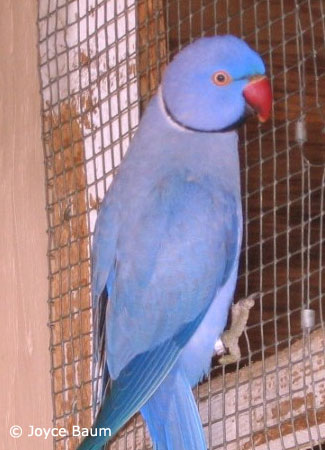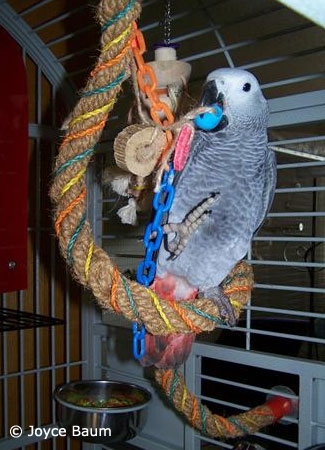Interviews By The Bird Experts
An Interview With Joyce Baum

This week, ParrotFeather.com is interviewed Joyce Baum. She is a
breeder who specializes in
Indian Ringnecks, Hawkheads, and
African
Greys. She is an avid member of many bird organizations such as the
Arizona Avicultural Society, Arizona Seed Crackers Society, and many
other Asiatic Breeders' groups. Read her interview and see what she has
to say about the art of breeding birds.
Currently you are a member of many bird clubs and associations nationally and internationally. Is it something you think all bird members should do? What are the benefits of joining a bird club ? Should all bird owners do so?
Once I joined our local bird club in Tucson, AZ (Avicultural Society of Tucson) and began to raise birds, I then joined all the other bird clubs in the state of Arizona, as well as the American Federation of Aviculture, Later, due to my interest in Indian Ringnecks I also joined the Indian Ringneck Association of South Africa and the international organization Asiatic Breeders Association. I found these organization great places to learn more about my birds and to connect with others around the globe. I also began the BirdBreedersForum at Yahoo, and participated in other bird groups online, learning, and sharing my own experiences. I believe it helps all bird owners to learn as much as they can about their birds by joining organizations like these, and to read as many books as possible, to become well-informed about birds and why they do what they do.
You specialize in breeding many birds; however, one major fascination seems to be Asiatic parrots, particularly Indian Ringnecks. Why? What is alluring about them to you?

Besides being gorgeous to look at, I find Indian Ringnecks to be extremely intelligent. Also, the many different mutations can be addictive. Another reason I love them so much, is the way they eat. They are willing to try anything you give them, and they LOVE to eat.
You have written for magazines, written handouts, and started a mailing list on Indian Ringnecks. Why do you spend so much time educating people about them?
When I began raising birds, I didn’t know anything about them, so I joined clubs, went online and read, bought books to read, and when I needed help, other experienced club members were always willing to help. So that’s what I do...I believe we owe it to these birds to give them the very best care we can, as they are completely dependent on us.
Many new bird enthusiast believe breeding is a lucrative venture. What are your thoughts on the subject?
If you really love the birds, and care about where they go when you sell them, you become fussy about who you sell them to, and there is not much money to be made. For me, it’s a hobby I enjoy, so making money is not important. If I can make enough to feed and care for my birds, I’m happy.
What advice would you give someone looking to start breeding parrots in general?
Learn all you can before beginning to buy any birds. Learn about all the different species before deciding on the ones you want to raise, find out about their habits, foods needed to keep them healthy, types and sizes of aviaries...learn, learn, learn.
African Grey parrots are popular for their intelligence and their ability to mimic human speech well. Because of this, many people purchase these birds on impulse. Could you shed some light on what owners might come to expect if they purchase one?
When someone wants to buy an African Grey from me, I interview them to find out if they have any parrot experience in general, how much they know about Greys, and why they want one. I don’t sell to someone buying one on impulse. I also tell them that not all birds talk, so if they get one that doesn’t talk, they should enjoy the bird for its other attributes. Once they are well educated about African Greys, I will consider them as possible owners for one of my babies. Then they will have a well socialized bird, and know how to care for it.
African Greys are also notorious for feather picking. What are your thoughts on the subject. What do you believe is the cause of this destructive behavior?
I heard and believed this prior to ever owning an African Grey; thus
did not have any as pets or breeders for a number of years. Then I
discovered this is usually a learned behavior caused by stress, which in
turn is caused by ignorance. If a person takes the time to learn about
these birds, and know that they are not domestic, but still considered
“wild” birds, even though they are raised domestically and hand fed,
this is a problem that can be avoided. I was also told that Greys are
not birds to cuddle; they just don’t do that. What a joke...all my
babies and pets love to cuddle and spend time with their humans.
I have recommended people to read this book, regardless of what kind of
bird they wish to buy: WHY DOES MY BIRD DO THAT? by Julie Rach. It is
very well written and once a person knows more about their bird’s
natural, wild instincts, they can avoid making mistakes that cause the
destruction of feathers as well as other bad habits.
What are some tips that you could share for those looking to breed African Greys. How do you pair your greys for breeding?

The easiest way is to begin by buying proven breeders from a
reputable breeder. If you are going to set up brand new pairs, it may
take years. Greys tend to co-habitate, without fighting, but will not
breed unless they like the bird you have partnered them with. For
instance, I purchased a proven pair of Greys years ago; female was
former pet and still tame, and male was parent raised. She was 3 years
and he was 4 years, and they had raised babies for the previous owner.
She decided not to breed anymore, so I bought the pair from her. The
first year they raise a couple clutches of babies for me and were
wonderful parents, then they quit.
After a number of years I realized they wouldn’t even sit by each other
anymore; it seemed they wanted a divorce! So I proceeded to try to
repair them. It took me 6 years, and a number of other males and
females, before they would bond with another bird they liked, and
produce babies again. These birds breed when they want to, and prefer to
choose their own mate.
I recommend not trying to breed Greys that have been pets for many
years. Many of these birds tend to be well bonded with humans and don’t
want to be with another bird. I’ve had a pet male Grey and a pet female
Grey for about 18 years. They have been side by side all these years in
their own cages, and when let out to wander around, will get into fights
when they get together. They just don’t like each other; they’d rather
be with the humans they are bonded to. So these birds will likely never
breed. Pet females if set up to breed while young, will be more likely
to breed than pet males will. Some of these males take many years to
finally breed, and some will never breed.
You have also written material on Hawkhead parrots and they are known to be parrots for much more advanced bird owners. What are your thoughts? Is this just a myth?
Personally I hate it when people “profile” birds like this. Most of these stories, or myths, come from people who are uneducated about their birds before they buy them, regardless of what species it is. A good place to learn from other Hawkhead owners is at the Hawkhead list at Yahoo. Most of them are pet owners and tell great stories about their beloved pets. For some of them, this is the first bird they ever owned. There are also a couple of articles in the files there, including mine which has been published in a couple of national magazines.
Why is it important to not sell an unweaned baby parrots?
Here is my article on this subject.
Why do you believe the Hahn's Macaws is a wonderful pet?
All birds can make wonderful pets if the potential bird owners will just take the time to learn about them first. As I’ve told some uneducated people, most birds are noisy, demanding, destructive and messy. If this is not something they can live with, perhaps they should get a tank of fish? Most Macaws can be extremely noisy; the Hahns is not as loud since it’s the smallest Macaw, but it still can be very loud. They can be lots of fun, and if raised right, perhaps not so loud. You should never give a bird what it wants when it screams, whether it’s attention, food, or just out of its cage. It’s like raising a human child; if you give them what they are screaming for, you are teaching them how to get what they want. These birds are very intelligent, similar to 2- to 3-year-old human children.
What has changed in the bird industry since you began?
The economy has brought many prices down, so it’s much harder to cover expenses in these times. The saddest thing I’ve seen is that many of the “old-timers” have either passed away, or just retired, and there are not a lot of younger people breeding these wonderful birds we have. With all of the changes in laws for importing birds, if a species dies out in this country, it may be impossible to import more of them to breed them again. With all of the rain forests being in more danger of being cut down as time goes by, and with the smugglers catching the birds however they can, killing many in the way they do it, the future looks grim for these wonderful birds in their original habitats. So it’s important for people to learn all they can, and consider breeding some of these birds, so that in the future our children can still enjoy them.
For more information please visit:
http://www.ringnecklady.net
Direct E-mail:
ringnecklady@msn.com




